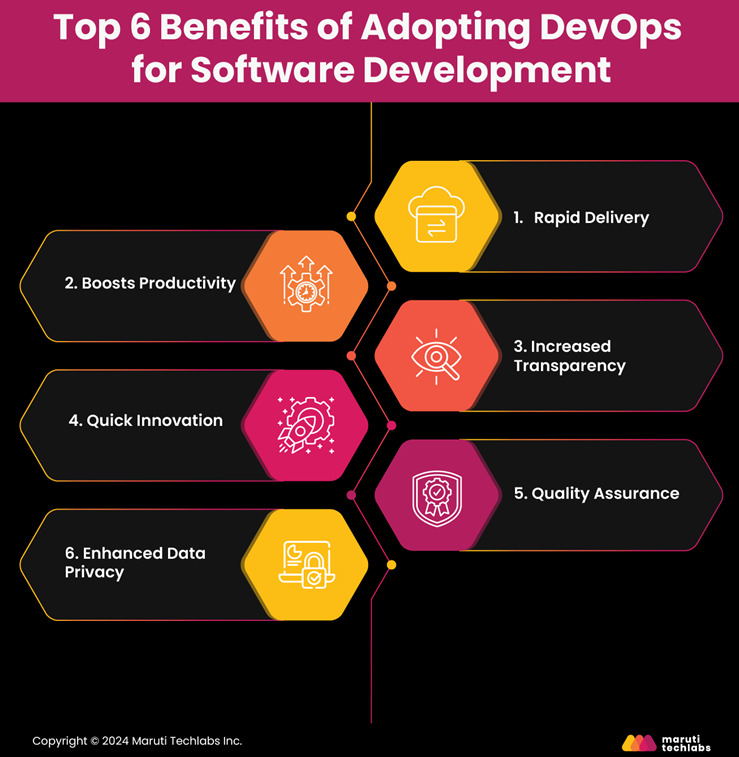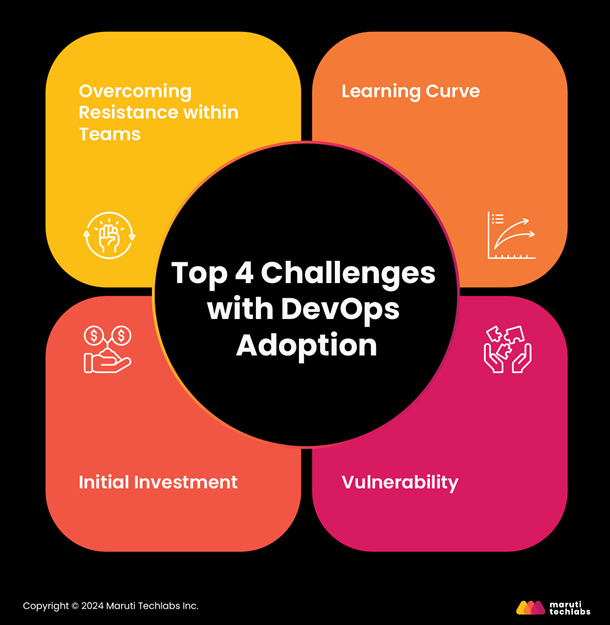Introduction
DevOps has revolutionized the landscape of software development. By merging development (Dev) and operations (Ops), it has significantly enhanced the software delivery process while maintaining governance, quality, and control. But what led to the rise of DevOps?
As the saying goes, “Necessity is the mother of invention.” Traditional development methodologies created silos and delivery bottlenecks, lacking effective solutions. This is where DevOps emerged—bridging the gap between software development and IT operations teams.
This blog explores the key benefits, challenges, and the profound impact DevOps has on software development.
Top 6 Benefits of Adopting DevOps for Software Development
According to Markets and Markets, the DevOps market was valued at $10.4 billion in 2023 and is expected to reach $25.5 billion by 2028, growing at a CAGR of 19.7%.
Below are the most significant benefits of integrating DevOps into the Software Development Lifecycle (SDLC):
1. Rapid Delivery
DevOps accelerates the development, testing, and deployment phases with Continuous Integration (CI) and Continuous Delivery (CD). It creates an automation framework that adapts to evolving user needs, ensuring timely software updates.
2. Boosts Productivity
DevOps eliminates inefficiencies and idle time, allowing teams to focus on high-value tasks. This iterative approach increases productivity compared to traditional, sequential development processes.
3. Increased Transparency
DevOps encourages transparency in data access and process visibility, which fosters collaboration between development and operations teams. This shared responsibility enhances communication, goal alignment, and overall team efficiency.

4. Quick Innovation
The shorter development cycles in DevOps pave the way for innovation. The agile, fail-fast culture fosters innovation, enabling companies to refine and evolve their products.
5. Quality Assurance
DevOps facilitates a continuous feedback loop, enabling teams to resolve issues promptly. Automation and Infrastructure as Code (IaC) ensure high-quality software with fewer manual errors.
6. Enhanced Data Privacy
DevOps enhances data privacy by eliminating the need to store sensitive data within base code. Through secure vaults and secret managers, it ensures centralized and secure storage, along with better monitoring and auditing of critical assets.
Top 4 Challenges with DevOps Adoption
Despite its many benefits, adopting DevOps can come with challenges. Let's explore some of the key obstacles:
1. Overcoming Resistance within Teams
Transitioning to DevOps often requires a cultural shift within the organization. Building trust and aligning development and operations teams with shared goals, metrics, and tools are essential for a smooth adoption process.
2. Learning Curve
Creating an effective DevOps team demands commitment to continuous learning and improvement. This journey takes time and requires strategy, effort, and the right mindset.

3. Initial Investment
For startups or organizations with limited resources, the upfront costs of DevOps adoption can be daunting. Investing in automation tools, infrastructure, and employee training is essential, but it comes with significant initial expenses.
4. Vulnerability
Security can sometimes be overlooked in the rush to adopt DevOps. Open-source tools and inadequate access controls can expose vulnerabilities. To address these risks, organizations should adopt DevSecOps practices, which involve continuous security testing and monitoring.
How DevOps Surpasses Traditional Software Development?
Here’s how DevOps outperforms traditional development methods in key areas:
|
Aspect |
DevOps |
Traditional Software Development |
|
Team Structure |
Multi-team collaboration, shared responsibility |
Siloed development and operations |
|
Development Time |
Accelerated through CI/CD |
Slow due to manual handoffs |
|
Deployment |
Frequent, smaller releases |
Time-consuming, large releases |
|
Automation |
Heavy reliance on automation |
Limited automation |
|
Infrastructure Management |
Automated using IaC |
Managed manually by the workforce |
|
Flexibility and Adaptability |
Agile and quick to adapt |
Less adaptable to changes |
|
Risk Management |
Continuous testing and automated processes |
Higher risk due to manual processes |
|
Monitoring |
Constant monitoring and feedback |
Limited visibility until deployment |
|
Cost Efficiency |
Reduced long-term costs |
Increased inefficiencies and costs |
Should You Implement DevOps in 2025?
While DevOps offers substantial benefits, it may not be suitable for every business. Before deciding, consider these factors:
Does Your Company Need Quick Releases?
If your business doesn’t require frequent software updates or continuous improvements, DevOps may not be worth the investment. If your current infrastructure meets your needs, transitioning may not be necessary.
Security or Speed?
The fast-paced nature of DevOps services requires consistent monitoring. Without proper security measures in place from the outset, DevOps services can potentially do more harm than good, particularly in industries like healthcare or banking, where safeguarding sensitive data is crucial.
Is Automation a Priority for You?
DevOps heavily relies on automation, but not everything can be automated. For some processes, human intervention is necessary. Ensure that automation aligns with your business needs before adopting DevOps.
By carefully considering your company's needs, implementing DevOps can make software development faster and more efficient.
Conclusion
DevOps adoption continues to surge, with organizations increasingly recognizing its transformative benefits, such as faster delivery, increased productivity, and improved software quality. However, transitioning to DevOps requires strategic planning, time, and effort.
If your organization lacks the expertise to navigate DevOps adoption, partnering with a proven DevOps consulting company can help ensure a successful implementation.
Connect with us to learn how DevOps can drive transformation and innovation for your software development process.
Relevant blogs:
https://marutitech.com/devops-vs-cicd/
Website of Source: https://marutitech.com/
Source: Story.KISSPR.com
Release ID: 1348600
